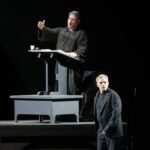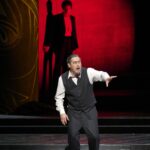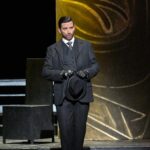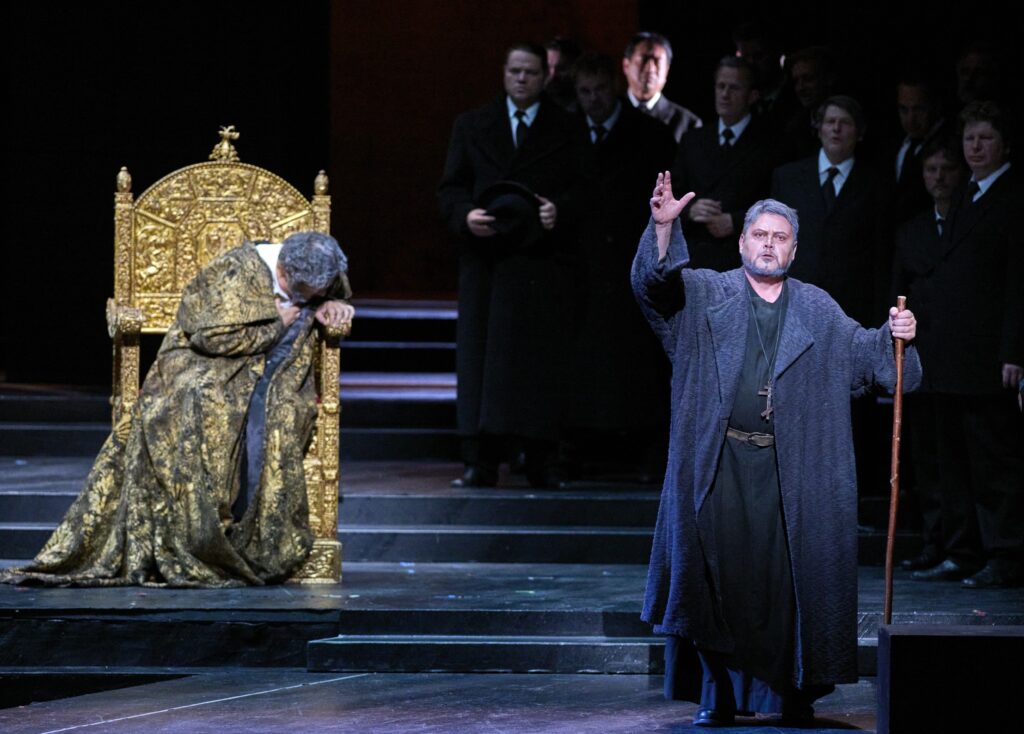Mussorgsky’s opera’s breakthrough was in Rimsky Korsakov’s version, Mussorgsky’s uncompromising genius, and original musical style much misunderstood. And Mussorgsky’s Pushkin-inspired Godunov is a sobering, humanistic counter-reading of conventional history. So the central scenes are in a monastery, where the Monk Pimen is completing his history of Russia. The last Chapter is about the murder of the young tsarevich Dimitry by Boris’ henchmen. And his student Grigori absconds to join the rebels against Boris.
In front of a Moscow monastery, the Chorus sing of their repression and abuse. But on Vienna State Opera’s stage, they’re in modern dress, like an early 20th century demonstration. In Mussorgsky’s opera, they’re being whipped, forced to beg Boris Godunov to be their Czar. Hence the foreman’s, What’s the matter with you, all turned to stone? Chorus respond, Oh, Father don’t desert us. We are all your orphans.’ In the opera, the Chorus are especially important, as if Godunov’s conscience, the voices of Russia’s soul commenting on Godunov.
The stage is a sea of black and grey, relieved by red vests and scarves. Are we meant, in Yannis Kokkos’ staging, to see the Godunov story as a political parable: (relating it to 20th century revolution?) True believers! But Boris is unyielding, they sing. Now no more hope for our country, the land split by anarchy. ‘Pray that he will save our country!’ Historically, Godunov’s Russia (1598-1605) -as up to the 1917 Revolution- was defined by religion, the Russian Orthodox Church. So the crowd are holding up icons.
Tubas, cymbals, bells, -the whole range of percussion- a joyous cacophony of exotic sounds. A stage filled with people, like a market. Boris Godunov (Alexander Tsymbalyuk) in gold cloak, ascends steps (to the Kremlin). They sing of the sun shining on Boris in glory. At his Coronation, Godunov appears innocent, pleading, behold the tears of your faithful servant. And sincere. May I serve the people in glory. All are invited to the banquet, from beggars to Boyars. The sheer orchestral diversity for 1872- pre-figuring Debussy, Ravel amongst others- is remarkable.
 In the third (of seven scenes), in the (Chudov) monastery, Pimen is transcribing his last chapter: the murder of Tsarevich Dmitri on Godunov’s orders. The minimalist stage wall is dominated by a crucifix, but at an angle. The elderly monk (Vitalij Kowaljow) seems young, but his bass eloquently sung. Grigori (Dmitry Golovnin)is deeply moved hearing that Dmitri would be the same age as him. Grigori sings of Boris, everyone trembles before you, yet in a cell a monk is writing an indictment against him. Next scene (4), Grigori, a fugitive, joins rebel friars in a tavern on the Russian-Lithuanian border. They complain, Christians today don’t give us anything (alms); all they do is get drunk!
In the third (of seven scenes), in the (Chudov) monastery, Pimen is transcribing his last chapter: the murder of Tsarevich Dmitri on Godunov’s orders. The minimalist stage wall is dominated by a crucifix, but at an angle. The elderly monk (Vitalij Kowaljow) seems young, but his bass eloquently sung. Grigori (Dmitry Golovnin)is deeply moved hearing that Dmitri would be the same age as him. Grigori sings of Boris, everyone trembles before you, yet in a cell a monk is writing an indictment against him. Next scene (4), Grigori, a fugitive, joins rebel friars in a tavern on the Russian-Lithuanian border. They complain, Christians today don’t give us anything (alms); all they do is get drunk!
In the Czar’s quarters at the Kremlin, Xenia, Boris’ daughter (Ileana Tonca), laments the death of her handsome prince : I’ve not won you for the grave, my beloved bridegroom. Godunov comforts her, they’ll find another prince. No, she’ll stay loyal to him. Tonca’s beautiful soprano radiates against the gloom (monochrome sets.) Then, showing more of Godunov’s endearing side, the loving father, he mentors his son Fyodor (mezzo Isabel Signoret). But these are lessons in sustaining patriarchy. Fyodor brings out a map, the Russian empire extending from Perm in Siberia, as far west as Lithuania. ‘One day he will inherit the realm…’
Then, Godunov is on his own, his aria-a soliloquy- at the heart of the opera. He sings, I have reigned for six years, but this heart is heavy. He takes pleasure neither in power, nor the realm. Everywhere betrayal and rebellion! Alexander Tsymbalyuk’s bass is refined and sonorous, but characterless, and for me lacking in real drama. (I’m comparing Tsymbalyuk with Rene Papa who sung (2016), with both astonishing range, and human warmth.) But Tsymbalyuk sings tenderly, how he hoped to find peace for his family, but fearful of God’s wrath, robbed of his bridegroom.
He’s visited by Prince Shuisky, tenor Thomas Ebenstein, memorable in the role. Shuisky, one of the Boyars (Barons rivalling the Czar’s power), comes bearing no malice! But as a messenger with news from Krakov. (All people like Shuisky are clever, but demons, sings Boris aside.) A pretender to the Throne has appeared in Lithuania.- His name?- The man claims to be Dimitri. Boris asks Shuisky -a witness- to recollect Dmitri’s murder. Godunov, obsessed, asks, ‘have you ever heard of dead children rising from their coffins?’ He laughs, (shouldn’t Tsymbalyuk raise the heavens?)And he asks Shuisky, did he recognise the dead child laying by the roadside as Dimitri.  Ebenstein/Shiusky sings movingly of seeing Dimitri’s corpse in the cathedral, as if sleeping in his cradle; and of the other thirteen bodies.
Ebenstein/Shiusky sings movingly of seeing Dimitri’s corpse in the cathedral, as if sleeping in his cradle; and of the other thirteen bodies.
Boris feels as if he’s suffocating. Such terrible remorse! ‘A single stain is enough,’ he sings, ‘then your soul is poisoned.’ A small boy, an apparition, appears against a scarlet-red curtain. Have mercy on the son of Boris, he pleads.
Outside St.Basil’s Cathedral, Chorus sing, he has been cursed again. They sing of conspiracies, of a mass for the Tsarevich. Of seventy put to death for conspiring against Boris and his followers. Mussorgsky’s orchestration spectacularly depicts the Fool who frightens the children playing. The starving people are begging Boris to give them bread.
The staging, the square in front of the Cathedral, consists of monumental, Soviet-era concrete blocks, and there’s a giant statue left-of-stage. (Is it Lenin?) ‘Soon the darkness will descend on Russia,’ sings the Fool (Andrea Giovannini). Background, Mussorgky’s recurrent theme, leitmotiv, representing Boris.
In the last scene, a room in the Kremlin, the Boyars are all in dark suits, like undertakers. (Sorry if you were expecting something more colourful, historically authentic, 17th century robes?) Shuisky warns the Boyars of Boris’ depressed state, his hallucinations; how he saw him trembling and bathed in sweat.
Tsymbalyuk’s Boris is sitting on his throne in gold robes of state. An old man awaits an audience. Kovalyov’s Monk Pimen relates a shepherd’s story: incurably blind since childhood, but his hearing acutely sensitive, he’s urged to go to the Cathedral. I am the Tsarevich Dimitri, God has made me one of Russia’s angels. And he could see again.
Boris tells Fiodor, ‘Never ask how I came to Russia’s throne’. And realising his end is near, takes leave of his son. Tsymbalyuk sings poignantly, invoking divine right, ‘you are my lawful successor.’ Boris warns him against the scheming Boyars’ treachery. And appeals, ‘Honour the Saints, keep your conscience pure.’ He’s led away, accompanied, barely able to stand. ‘Oh God, my misdeeds are terrible, forgive my sins.’
The modern staging is a reasonable compromise, but unnecessarily dull and gloomy. Mussorgsky’s great opera has to be seen and heard, the music alone is a revelation. Hardly better played than Vienna State Opera Orchestra and chorus under Michael Gütller. Of a distinguished cast, Tsymbalyuk was tonight disappointing, but the real stars were Vienna’s (supplemented) choruses, Mussorgsky’s suffering masses. © PR. 11.5.2022
Photos: Vitalij Kowaljow (Pimen), Dmitry Golovnin (Grigorij); Alexander Tsymbalyuk (Godunov), Isabel Signoret (Fyodor); Thomas Ebenstein (Shuisky) © Michael Pöhn/ Wiener Staatsoper

